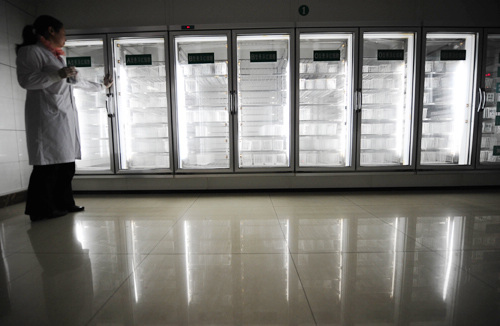|
 |
|
OUT OF STOCK: The blood storage cabins are all empty in the Yunnan Kunming Blood Center on October 27, 2010 (QIN QING) |
On the evening of February 9, a micro-blog post pleading for type-A blood platelets was posted on China's twitter, Weibo.com, and within a day, the message was forwarded thousands of times.
Cheng Yuntao, who wrote the post, is the father of a 3-year-old boy who suffers from leukemia and needed the transfusion of type-A blood platelets urgently.
"There was insufficient blood of this type in the hospital, so we had to rely on blood donation," said Cheng, a Beijing resident.
"Almost all the city's hospitals are suffering from blood shortage at the moment," said Yang Pingdi, a senior doctor at the Blood Center in Beijing Daopei Hospital, where Cheng's son was receiving treatment.
According to Yang, the treatment of more than 100 patients in Daopei Hospital had to be delayed due to the shortage of blood. Cheng had to turn to netizens for help. Within 10 days, six people volunteered to donate blood and only one volunteer's blood was a suitable match. On February 19, Cheng's son received a blood transfusion and his condition stabilized.
Not every patient is as lucky. Wang Chaoqun, another child at the same hospital, didn't receive a transfusion in time and his disease is now too serious to cure.
Some patients, after being informed that blood was unavailable in the hospital, transferred to other facilities but found the situation is the same throughout the capital and in other parts of the country.
"It has become a nationwide problem," Yang said. "Every hospital is in urgent need of blood."
The blood shortage began in China as early as 2007. At first, the shortage was regional and seasonal, but gradually it became regular.
In October 2010 the blood bank in Kunming, capital of southwestern Yunnan Province, was almost empty. The same problem occurred in many other cities as well. In big cities such as Beijing and Shanghai, where major hospitals are clustered, it is much more severe.
At a press briefing on December 13, 2011, Deng Haihua, a spokesman for the Ministry of Health, admitted that there was a widespread blood shortage in China.
"The blood donation rate in our country is only 8.7 percent, which lags behind the 45.4 percent rate in high-income countries, the 10.1 percent rate for middle-income countries and even the 10 percent recommended by the World Health Organization," he said.
China was able to meet its demand for blood relying on a compulsory blood donation regime until 1998 when voluntary blood donation was introduced. According to the Ministry of Health, from 2006 to 2010, the annual number of volunteer donors in China increased from 6.75 million to 11.8 million, and the yearly volume of blood donation rose from 2,295 tons to 3,935 tons. Last year, the volume of blood donation reached 4,164 tons.
Sun Dongdong, a professor at Peking University, said that a major reason for Chinese people being reluctant to donate blood is that they believe the whole body should stay intact and blood is supposed to be a part of the body. Even if young people are willing to donate blood, parents often stop them as they are concerned that blood donation is bad for the health and might even cause infections. "Some college students dare not tell their parents after they donate blood," Sun said.
However, in the past two decades, the volume of blood needed has increased at a higher rate in China, as more surgeries involving blood transfusion such as liver transplants are being performed. Supplies at blood banks in many places were at critical levels at the end of 2010.
In 2011, the situation got even worse. A 21-year-old woman, Guo Meimei, who claimed to be the manager of a branch of the Red Cross Society of China (RCSC), showed off her luxurious lifestyle on Weibo.com, causing people to lose faith in Red Cross organizations. Although Guo was later found to have no connection with the RCSC, Red Cross blood centers across China have witnessed a sharp decrease in blood donors.
According to a report by The Beijing News, the volume of blood donation in Beijing declined by 5 percent during the first half of 2011, and by a further 13 percent in October and November last year.
| 